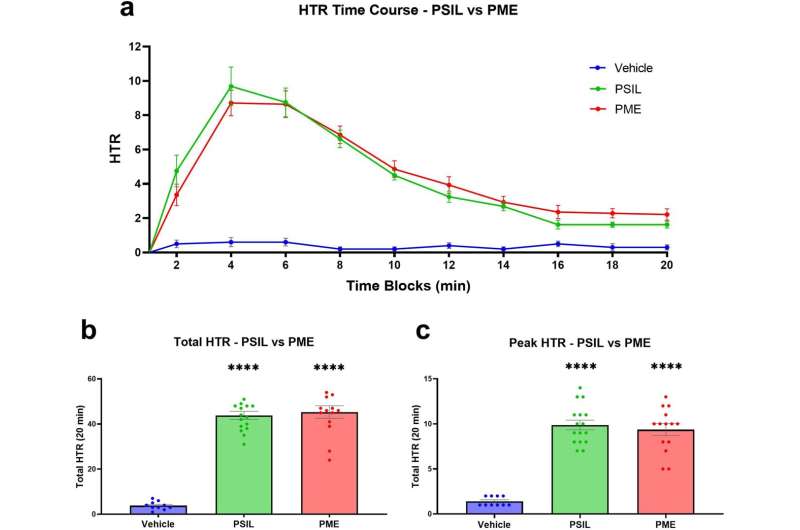This article has been reviewed according to Science X's editorial process and policies. Editors have highlighted the following attributes while ensuring the content's credibility:
fact-checked
trusted source
proofread
Exploring the therapeutic potential of natural mushroom compounds to address psychiatric disorders

A recent study suggests that mushroom extract containing psilocybin may exhibit superior efficacy when compared to chemically synthesized psilocybin. The findings are published in the journal Molecular Psychiatry.
The research, focusing on synaptic plasticity in mice, unveils promising insights into the potential therapeutic benefits of natural psychedelic compounds in addressing psychiatric disorders. The study indicates that psilocybin-containing mushroom extract could have a more potent and prolonged impact on synaptic plasticity in comparison to chemically synthesized psilocybin.
Millions of individuals globally, constituting a significant portion of the population, grapple with psychiatric conditions that remain unresponsive to existing pharmaceutical interventions. Alarming statistics reveal that 40% of individuals experiencing depression find no relief from currently available drugs, a trend similarly observed among those with OCD.
Moreover, with approximately 0.5% of the population contending with schizophrenia at any given time, there exists a pressing demand for innovative solutions tailored to those who derive no benefit from current medications. In response to this urgent need, psychedelic drugs are emerging as promising candidates capable of offering transformative solutions.
The study's preliminary findings shed light on the potential divergence in effects between psilocybin-containing mushroom extract and chemically synthesized psilocybin. Specifically, the research focused on the head twitch response, synaptic proteins related to neuroplasticity, and metabolomic profiles in the frontal cortex of mice.
The results indicate that psilocybin-containing mushroom extract may exert a more potent and prolonged effect on synaptic plasticity when compared to chemically synthesized psilocybin. Significantly, the extract increased the levels of synaptic proteins associated with neuroplasticity in key brain regions, including the frontal cortex, hippocampus, amygdala, and striatum. This suggests that psilocybin-containing mushroom extract may offer unique therapeutic effects not achievable with psilocybin alone.
Metabolomic analyses also revealed noteworthy differences between psilocybin-containing mushroom extract and chemically synthesized psilocybin. The extract exhibited a distinct metabolic profile associated with oxidative stress and energy production pathways.
These findings open up new possibilities for the therapeutic use of natural psychedelic compounds, providing hope for those who have found little relief in conventional psychiatric treatments. As the demand for innovative solutions continues to grow, the exploration of psychedelic drugs represents a crucial avenue for the development of transformative and personalized medicines.
Additionally—in Western medicine, there has historically been a preference for isolating active compounds rather than utilizing extracts, primarily for the sake of gaining better control over dosages and anticipating known effects during treatment. The challenge with working with extracts lay in the inability, in the past, to consistently produce the exact product with a consistent compound profile.
Contrastingly, ancient medicinal practices, particularly those attributing therapeutic benefits to psychedelic medicine, embraced the use of extracts or entire products, such as consuming the entire mushroom. Although Western medicine has long recognized the "entourage" effect associated with whole extracts, the significance of this approach gained recent prominence.
A major challenge with natural extracts lies in achieving a consistently stable compound profile, especially with plants; however, mushrooms present a unique case. Mushroom compounds are highly influenced by their growing environment, encompassing factors such as substrate composition, CO2/O2 ratio, light exposure, temperature, and microbial surroundings. Despite these influences, controlled cultivation allows for the taming of mushrooms, enabling the production of a replicable extract.
This research not only underscores the superiority of extracts with diverse compounds but also highlights the feasibility of incorporating them into Western medicine due to the controlled nature of mushroom cultivation.
The research was led by Orr Shahar, a Ph.D. student, and Dr. Alexander Botvinnik, under the guidance of researchers Dr. Tzuri Lifschytz and psychiatrist Prof. Bernard Lerer from the Hebrew University-Hadassah Medical Center.
More information: Orr Shahar et al, Effect of chemically synthesized psilocybin and psychedelic mushroom extract on molecular and metabolic profiles in mouse brain, Molecular Psychiatry (2024). DOI: 10.1038/s41380-024-02477-w




















